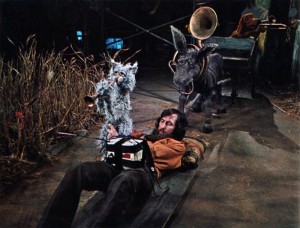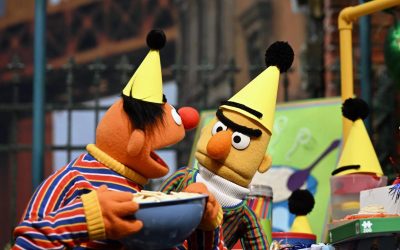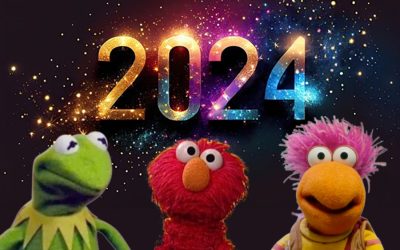Here at Tough Pigs, we’ve covered nearly every Christmas special Jim Henson and/or the Muppets ever made. But most of the non-holiday-related specials have been neglected until now. Each week, I’m joined by another Tough Pigs writer to watch a classic Muppet special that has nothing to do with Christmas.
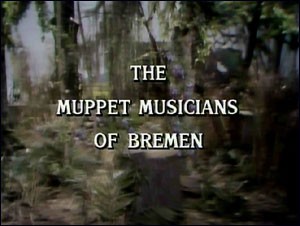 Anthony: After three straight fairy tale specials with King Goshposh/King Rupert in them, this week is a big shift in tone and setting – 1972’s Muppet Musicians of Bremen, which focuses on a band of musical animals in the Louisiana Bayou. This is only the second time I’ve ever seen it, and the first was about fifteen years ago. So I was excited to rewatch it, and I’m even more excited to be joined by Matt Wilkie. Hello, Matt!
Anthony: After three straight fairy tale specials with King Goshposh/King Rupert in them, this week is a big shift in tone and setting – 1972’s Muppet Musicians of Bremen, which focuses on a band of musical animals in the Louisiana Bayou. This is only the second time I’ve ever seen it, and the first was about fifteen years ago. So I was excited to rewatch it, and I’m even more excited to be joined by Matt Wilkie. Hello, Matt!
Matt: Hi Anthony! I’m excited to be here. I’m interested to hear how the Muppet Musicians of Bremen lived up to your memories. I can’t recall the last time I saw it; it must have been during a broadcast on Nickelodeon when they did Muppet specials quite frequently. So fifteen years is probably much more recent than the last time I had seen it. I also stumbled upon a vinyl record of the story about a year and a half ago but I still only listened to side one of that record. So for me, almost everything in this special felt brand new.
Anthony: That’s true for me. I remembered the general set-up, and I remembered that the villains were humans with puppet heads. But upon rewatching it, I think I know the reason I never did so before – it really isn’t very funny.
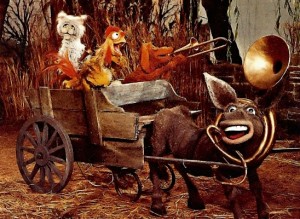 I don’t even mean that as a criticism, necessarily, because comedy isn’t really the goal here. It’s much more concerned with making the audience sympathize with the characters (Leroy the Donkey, T. R. Rooster, Rover Joe the Hound Dog, and Catgut the – you guessed it – cat) than it is with making the audience laugh.
I don’t even mean that as a criticism, necessarily, because comedy isn’t really the goal here. It’s much more concerned with making the audience sympathize with the characters (Leroy the Donkey, T. R. Rooster, Rover Joe the Hound Dog, and Catgut the – you guessed it – cat) than it is with making the audience laugh.
Matt: I agree, I was really struck with how little comedy there was here. It was cute and the songs were great, and as a puppetry achievement there is a lot going on. But that’s all at the sacrifice of flat-out jokes or funny moments. I’m glad that Henson and company eventually found a way to hone their craft in later years so that technical achievements and humor were more even handled.
Anthony: What’s strange is that they had already found that balance in the previous two specials, at least to a degree. “Hey Cinderella” and “The Frog Prince” are both packed with hilarious jokes in addition to having satisfying stories. When Ryan Roe and I watched “Hey Cinderella,” I mentioned that it added heart to the all-jokes formula of “Tales of the Tinkerdee.” This one goes too far in the opposite direction, I think. The animals are all genuinely endearing characters, but it isn’t really that much fun to watch four scenes of them getting chased around or menaced or beaten by their cruel owners.
Matt: Including a dog being literally thrown through a window! It breaks the glass and everything. I was very shocked by how violent that was, even to a puppet dog.
But you’re right, the formula was refined in “Hey Cinderella” and “The Frog Prince,” so it seems like a backpedal. I’d wager that most people remember those specials much more than “Musicians of Bremen,” and the unevenness most likely has to do with that. I wonder if the imbalance is due to the focus on puppetry advancements. There is a lot of talk in the archives about how the people puppets were something no one had ever seen before, and it’s something you still rarely see today.
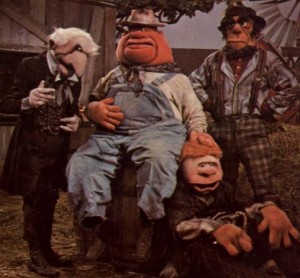 Anthony: It’s striking, to be sure, and it certainly adds to the overall unpleasant nature of those characters. I don’t know if Henson considered casting actual humans in those roles, but I’m glad he didn’t. They look like inhuman monsters, which makes the aforementioned violence more palatable.
Anthony: It’s striking, to be sure, and it certainly adds to the overall unpleasant nature of those characters. I don’t know if Henson considered casting actual humans in those roles, but I’m glad he didn’t. They look like inhuman monsters, which makes the aforementioned violence more palatable.
I just wish they were more entertaining as characters. The scenes with the four of them together in the cabin feel like they drag on forever, because Henson and Juhl were so focused on the puppetry they forgot to make them entertaining. They’re mostly just cruel and heartless, when they should be mean in a comical or outrageous way.
Matt: Absolutely. We love watching Charles Grodin because he’s a buffoon. But these guys are just terrible. Nothing redeeming about them at all. They belong in a drama.
Anthony: The one exception is Mean Floyd, and that’s mostly just because he’s voiced by Jim Henson. The others (including the Jerry Nelson-voiced Caleb Siles) all sound like genuine tough guys, but Mean Floyd has the good fortune to sound like a scared Ernie.
Which brings me to another thing that bothered me here – the relative lack of Muppeteer voices. Jim plays Kermit, of course, in addition to Mean Floyd, and Jerry gets to play a couple of characters. But most of the voices are by actors who hadn’t worked with Henson before this and never would again. It makes the whole thing feel less Muppet-y than it should.
Matt: Very true. It’s almost as if Kermit did a guest spot in another puppet troupe’s special.
I believe I read somewhere that there were some productions the Muppets did in Canada around this time and the reason they were able to get funding was that they were required to hire a certain percent of Canadians to work on them. Is that correct?
Anthony: That sounds familiar, although I can’t source it. Anyway, it certainly makes sense. I just wish they had hired actors who didn’t rely so heavily on impressions. Half the characters here are straight lifts – Lardpork is Kirk Douglas, Catgut is Carol Channing, Leroy is Lon Chaney Jr. in Of Mice & Men. It’s fine when Jerry Nelson does a bad John Wayne or whatever. I *know* him. He’s just wacky ol’ Uncle Jerry. But these just sound like anonymous bad imitations. It lends a slight “Rich Little’s Christmas Carol” vibe to the proceedings, which is never a good association to make.
Matt: May we never have anything we do associated with Rich Little.
Well, I suppose there’s a good reason why we never saw any of these voice actors work with the Muppets again. And if what I semi-remember reading is true, at least all we got were bad voices instead of bad puppetry as well.
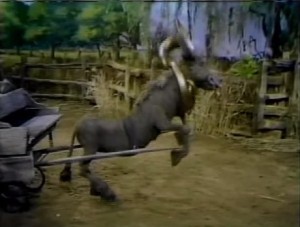 Anthony: I can’t argue with that. While I’d definitely enjoy Leroy more if he was voiced by Frank Oz, at least Frank really gets to strut his stuff on the performance. The special is full of tricks involving Leroy pulling his cart, dancing, playing the tuba, and excitedly wagging his eyebrows. He’s an amazingly expressive puppet, and he gets to express using his whole body. I know that the old “Muppet is a combination of puppet and marionette” story is a myth, but Leroy is one character it would accurately describe.
Anthony: I can’t argue with that. While I’d definitely enjoy Leroy more if he was voiced by Frank Oz, at least Frank really gets to strut his stuff on the performance. The special is full of tricks involving Leroy pulling his cart, dancing, playing the tuba, and excitedly wagging his eyebrows. He’s an amazingly expressive puppet, and he gets to express using his whole body. I know that the old “Muppet is a combination of puppet and marionette” story is a myth, but Leroy is one character it would accurately describe.
Matt: Absolutely! And that was my favorite part of the special, seeing the switches between hand puppet and marionette with the same character. Leroy was a real joy to watch in that regard, and it’s something that specials like this did that were lost along the way a little in Muppet history. I also remember marveling at that in “Emmet Otter’s Jugband Christmas” the last time I watched it. As much as I love the way Muppets can be done with green screen suits and multiple puppeteers, I love the simplicity of marionetting.
Anthony: The other characters aren’t quite as impressive, but we do get plenty of great shots like Catgut flinging herself down on a rock while telling her sad story. It’s the kind of movement that only puppets are capable of, and Henson and his team make it look so effortless.
Matt: I also really enjoyed Catgut’s dancing during her number. It was silly but she tried so hard to be sexy. Like Carol Channing channeling Jessica Rabbit, in the body of an old washcloth.
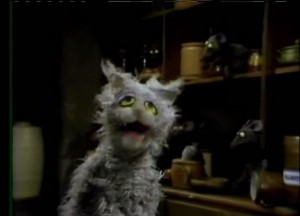 Anthony: That’s a good way to describe it, and also a good segue into the songs, which have lyrics by Jerry Juhl with music by Jack “Theme from Night Court” Elliott. Catgut’s second song – “You Gotta Know Your Friends” with a roomful of enthusiastic rats – is my favorite song in the special by far. Like you say, it’s this weird old-fashioned, vaguely sexual dance hall/cabaret number, and it’s bizarre and hilarious and perfect.
Anthony: That’s a good way to describe it, and also a good segue into the songs, which have lyrics by Jerry Juhl with music by Jack “Theme from Night Court” Elliott. Catgut’s second song – “You Gotta Know Your Friends” with a roomful of enthusiastic rats – is my favorite song in the special by far. Like you say, it’s this weird old-fashioned, vaguely sexual dance hall/cabaret number, and it’s bizarre and hilarious and perfect.
Matt: It had elements similar to “Let Me Be Good to You” from The Great Mouse Detective. I half-expected the rats to start throwing dollars bills at her.
I have a suspicion that the music was Jim’s favorite part of this special because so much of it is a call-back to what he must have listened to in his childhood while growing up in Mississippi. There’s some truly beautiful stuff in there, all influenced by the south. I wonder if it was his or Jerry Juhl’s idea to move the story from its original setting of Germany to Louisiana, but no matter whose idea it was, Jim probably took it and ran with the music influence.
Anthony: I bet you’re right. Also, the choice to set the story in Louisiana reminded me of one of my favorite underrated Disney movies, The Princess and the Frog. That movie has a subplot where an alligator named Louis wants to play jazz for humans, so the comparison was unavoidable.
Matt: You meant the alligator that was a complete rip-off of King Gator from All Dogs Go To Heaven?
Anthony: I’m sure I do!
In any case, Disney vs. Don Bluth flame wars aside, the 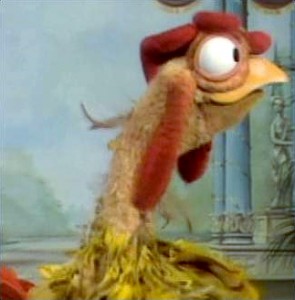 music here is terrific. Elliott’s style is very different from any of the regular Muppet composers, but his compositions have tremendous energy, and orchestration is just “off” enough to feel like Muppet stuff. Also we get to hear Jerry Nelson sing a very Shel Silverstein-esque country blues song, which is obviously wonderful.
music here is terrific. Elliott’s style is very different from any of the regular Muppet composers, but his compositions have tremendous energy, and orchestration is just “off” enough to feel like Muppet stuff. Also we get to hear Jerry Nelson sing a very Shel Silverstein-esque country blues song, which is obviously wonderful.
Matt: A classic blues song if there ever was one, all sung to hens. It reminded me of “A Boy Named Sue,” but then again, most blues songs do.
Anthony: Yeah, that was the one I was thinking of too!
Matt: The energy is very lively, that’s a great point. Even Kermit has a fun dance in the beginning, which almost seems out of place for him. I forget sometimes that when Kermit was narrating these specials instead of hosting like he did on The Muppet Show, he had more energy, too. He could just be silly and enjoy himself instead of worrying about keeping the lights on in the theatre.
Anthony: I love the idea that all of these narration gigs are just practice for his later full-time job as an emcee. One thing that struck me is how much more limited his role is here compared to “Frog Prince” and “Hey Cinderella.” In those he’s a full-fledged supporting character. His role is big enough that Disney owns the rights to them now. Here he’s more of a narrator, like in “Emmet Otter” or “The Christmas Toy.” I’m not sure who owns the rights to this, but it’s easy to imagine a Henson release with Kermit edited out and the opening scenes shredded to the point of confusion.
Matt: That might work, but Kermit does teach Leroy 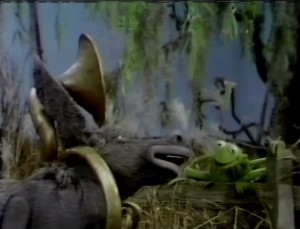 how to play the tuba. Maybe they just cut that scene and the implication is that he figures it out on his own. How hard is it to play a tuba? “Tubas: They’re So Easy to Play, Even a Jackass Can Do It!”
how to play the tuba. Maybe they just cut that scene and the implication is that he figures it out on his own. How hard is it to play a tuba? “Tubas: They’re So Easy to Play, Even a Jackass Can Do It!”
Anthony: Hey, all the other animals do it. One scene, Rover Joe just wants a hambone, and the next he’s playing trombone like he’s Commander Will Riker.
Matt: That’s what this special is missing – Picard on flute!
Anthony: We should sling-shot around the sun and go back to 1972, so we can tell Henson and Juhl to . . . make it so.
One bit of exciting history connected to this special – all of the rats and chickens were built for it. Watching it now, they just seem like regular rats and chickens we’ve seen a million times, but to the Muppet fans of the time, they were a thrilling new spectacle.
Matt: And where would we be without them now? Or more importantly, where would Gonzo be?
Anthony: Oh wow, yeah. That’s his entire social circle right there.
And honestly, rats and chickens might be “Bremen”’s 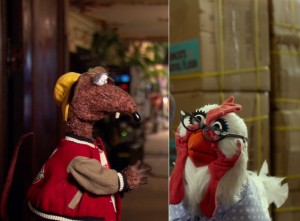 greatest contribution to the Muppet world. I don’t know that I’ll wait fifteen years this time, but I can’t say I’ll rush to watch it again.
greatest contribution to the Muppet world. I don’t know that I’ll wait fifteen years this time, but I can’t say I’ll rush to watch it again.
Matt: Same here. It’s a good special – not great, not terrible, but good – but there are plenty of other Muppetland specials I’ll watch before I pick this one.
Anthony: That about sums it up. Anyway, thanks for watching it with me today!
Matt: Thanks for asking me to watch it with you! I’ll see you at the fifteen year reunion!
Anthony: It’s a deal!
Next: Matthew Soberman joins me as we jump back to the psychedelic 60s for The Cube.
Click here to guess what T. R. really stands for on the Tough Pigs Forum.
by Anthony Strand and Matt Wilkie

